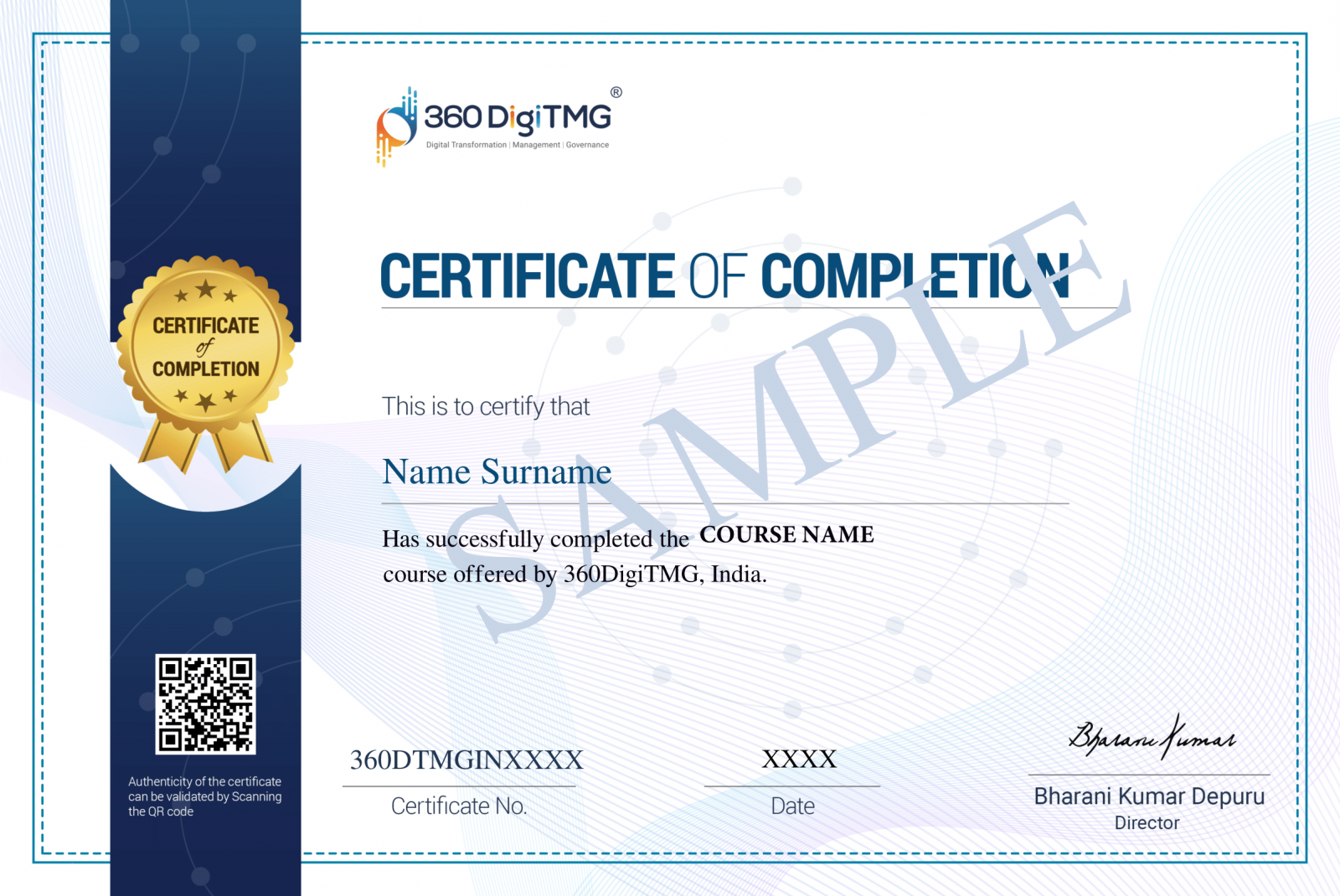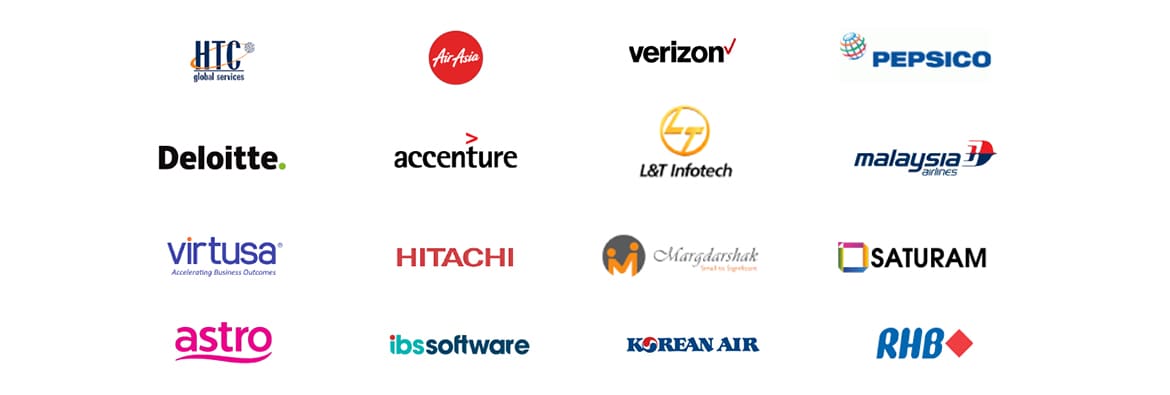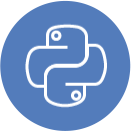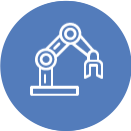Professional Certificate Course in Industrial Revolution 4.0 Training
- Get Trained by Trainers from ISB, IIT & IIM
- 40 Hours of Interactive Online Sessions
- 80+ Hours of Practical Assignments
- 2 Capstone Live Projects
- Job Placement Assistance
- Access to IR 4.0 Implementation Templates
2011 Learners
Academic Partners & International Accreditations
"Indian companies can increase their operating profits by 40% if they adopt Industry 4.0 in Manufacturing and Supply Chain Management." - The fourth industrial revolution or ‘Industry 4.0’ is characterized by an integration of new technologies like artificial intelligence, social media, cloud, and the Internet of Things. The industrial revolution 4.0 (IR4.0) has transformed the breadth and depth of model systems of production, management, and governance. The interconnected network of smart machines that can communicate with one another has made our factories efficient and fruitful thereby, resulting in less wastage. With smart manufacturing, there is an urgent need for experts who are not only familiar with business and production lines but are capable of analyzing large amounts of data to derive valuable insights that give production managers the ability to effectively prevent problems.
Industry 4.0 Training Programme Overview
Become a specialist in advanced technologies with the Certification Program on Industrial Revolution 4.0. Understand how to transform your organization and make it Industry 4.0 ready. Participants of the Certification on Industrial Revolution (IR) 4.0 program will learn about the fundamentals behind IR 4.0 and how they can adopt the latest technologies to solve real-world business problems. The five-day certification course will expose decision-makers of corporations to technological advancements such as the Industrial Internet of Things (IIoT), Cloud Computing, Big Data, Machine Learning, Artificial Intelligence, Cyber-Physical Systems, and Cognitive Computing. They will develop a deep appreciation for these technologies through industry-specific use cases and projects.
What is IR 4.0?
The transformation of traditional manufacturing and industrial practises using the latest smart technology is termed as The Fourth Industrial Revolution or Industry 4.0. Its prime focus is to develop machines that can analyze and diagnose problems without the need for humans to intervene. This is implemented by using large-scale communication between machines and the Internet of Things (IoT) establishment to provide increased automation and improved communication. Industry 4.0 networks a wide range of new technologies like IoT, smart sensors, mobile devices, 3D printing, Data visualization, etc. to create value in the systems so that they can broadcast decisions and achieve a high degree of self-reliance.
Industry 4.0 Certification Learning Outcomes
Data and Analytics are at the core of IR4.0 capabilities. It integrates processes horizontally and vertically in an organization be it product development, manufacturing, structuring, and internal operations from suppliers to customers respectively. Newer technologies have changed the engineering environment at an expedited pace. The emerging technologies, such as big data, cloud computing, internet of things, wireless sensor network, and mobile internet are beginning to be administered into manufacturing industries. The evolution in science and technology has constantly assisted industrial development all over the world. This course is drafted to offer learners an introduction to Industry 4.0 and its applications in the business sector and provides comprehensive coverage on the role of data, manufacturing systems, various Industry 4.0 technologies, applications, and case studies. Learners will gain deep insights into trends of Industrial Big Data and Predictive Analytics for Smart Business Transformation. They will also learn about the role of data, information, knowledge, System, Technologies for enabling Industry 4.0, and its collaboration in future organizations. They will be able to outline the various systems used in a manufacturing plant and their role in Industry 4.0. Students will be able to acknowledge the power of Cloud Computing in a networked economy and recognize the opportunities, challenges brought about by Industry 4.0, and how organizations and individuals should prepare to make the most out of this revolution.
Block Your Time
Who Should Sign Up?
- Candidates aspiring to be IR 4.0 consultants
- CEOs and other senior executives
- Plant heads, Operations heads, Line managers
- Employees of organisations that are planning to implement smart factories
- Research and Development heads and Industrial engineering heads
- Professionals who want to be a part of an organisation’s change management
Industrial Revolution 4.0 Modules
The planet today is very much driven by the smarts in automating decisions and processes. The emergence of new technologies in IT has resulted in massive improvements in computational power across all electronic devices and has magnified capabilities in connecting the dots in an increasingly connected society. The module commences with an introduction to IR4.0 and the factors driving it and its impact. Students will explore the trends in IIoT, Big Data, and Predictive Analytics for smart business transformation along with how to store sensor data on the cloud. Furthermore, students will learn about Automation, Cybersecurity, Robotics, Additive Manufacturing, 3D printing, and Augmented reality. The concluding module will cover the various applications of IR4.0 and acknowledge the drivers and enablers of Industry 4.0.
Tools Covered









Trend in IR 4.0 in India
The fourth industrial revolution also called a "smart factory" is a trend by itself towards automation. It incorporates cyber-physical systems (CPS), cloud computing, the internet of things (IoT), industrial internet of things (IIOT), and artificial intelligence that communicate and agree to provide services across organizations. Industry 4.0 also provides predictive maintenance by identifying maintenance issues ahead of time before the machinery fails or gets damaged allowing machine owners to perform cost-effective maintenance. Newer technologies like AI and automation have elevated our professional lives by increasing human productivity and today we are able to make smart choices in no time.
Among the other trends identified and acknowledged by various experts is the extensive dependency on 3D printing technology that can simplify the product design process by printing many geometric structures and can be very useful for printing spare parts and installing it locally. This reduces the dependency on suppliers and supply lead time. The principal forces of innovation and the megatrends like augmented reality, smart production, smart vehicles, smart homes, smart cities, and smart factories will dominate the arena of IR4.0. The IoT or Internet of things will facilitate a change with centralized controls and optimized processes and contribute to the creation of a smart environment with the help of sensors and simulation tools. Smart sensors are devices that can collect, interpret, and communicate the information to enable real-time monitoring which is critical to Industry 4.0.
How we prepare you
-
Additional Assignments of over 80+ hours

-
Live Free Webinars

-
Resume and LinkedIn Review Sessions

-
Lifetime LMS Access

-
24/7 Support

-
Job Assistance in Industrial Revolution fields

-
Complimentary Courses

-
Unlimited Mock Interview and Quiz Session

-
Hands-on Experience in Live Projects

-
Life Time Free access to Industry Webinars

Call us Today!

Certificate
Demonstrate your knowledge and understanding of the latest technologies for industrial use with the Certification on Industrial Revolution 4.0. Boost your confidence and improve your influence within the organisation.
Recommended Programmes
Data Science for Beginners using Python & R

 2064 Learners
2064 Learners
Big Data using Hadoop & Spark Course Training

 3021 Learners
3021 Learners
Artificial Intelligence (AI) & Deep Learning Course

 2915 Learners
2915 Learners
Alumni Speak

"The training was organised properly, and our instructor was extremely conceptually sound. I enjoyed the interview preparation, and 360DigiTMG is to credit for my successful placement.”
Pavan Satya
Senior Software Engineer

"Although data sciences is a complex field, the course made it seem quite straightforward to me. This course's readings and tests were fantastic. This teacher was really beneficial. This university offers a wealth of information."
Chetan Reddy
Data Scientist

"The course's material and infrastructure are reliable. The majority of the time, they keep an eye on us. They actually assisted me in getting a job. I appreciated their help with placement. Excellent institution.”
Santosh Kumar
Business Intelligence Analyst

"Numerous advantages of the course. Thank you especially to my mentors. It feels wonderful to finally get to work.”
Kadar Nagole
Data Scientist

"Excellent team and a good atmosphere. They truly did lead the way for me right away. My mentors are wonderful. The training materials are top-notch.”
Gowtham R
Data Engineer

"The instructors improved the sessions' interactivity and communicated well. The course has been fantastic.”
Wan Muhamad Taufik
Associate Data Scientist

"The instructors went above and beyond to allay our fears. They assigned us an enormous amount of work, including one very difficult live project. great location for studying.”
Venu Panjarla
AVP Technology
Our Alumni Work At

And more...
FAQs for Industrial Revolution 4.0 Course
In IR 3.0, computerisation and automation were considered important aids in improving productivity, and were given an enormous thrust. In IR 4.0, every process, machine and activity is broken down to the basic granular level and treated as a data point. Various measurement metrics are monitored for these data points to help in data-driven decision-making.
IR 4.0 is an ongoing process, with connectivity being the key. A business in this context must establish connection protocols for every machine in their ecosystem with the corporate network, which is fast and secure. Organisations must establish a clear cut plan of action with timelines to establish connectivity. As a next phase, a rigid signal capture and data storage system must be put in place. Data-driven decision-making models and protocols that can provide automated feedback to the system must be established. Training and sensitisation of employees towards the principles of IR 4.0, and software and hardware upgrades to meet the requirements of IR 4.0 connectivity are also important factors.
It enables easy backend integration with ERP/MES etc. It allows for various micro-services and the distribution of various functionalities to different nodes. 4.0 also makes resource management easy with transparent and monitored communication pathways. It is easy in this environment to add new protocols and processes as an additive measure. It is also possible to establish communications among various components and profit centres on the shop floor.
Lean manufacturing is an ongoing process of identifying wasteful practices, reducing costs and improving quality. Under the IR 4.0 paradigm, the focus is on connections among the various assets and nodes in an organisation. IR 4.0 architecture will eventually help achieve the goal of Lean.
Some of the key concerns that need to be addressed before moving to an IR 4.0 architecture are cyber security, handling an enormous volume of data, resource training and deployment, and very long ROI cycles that may lead to the company’s management pulling the plug midway.
The Internet of Things (IoT) is a term that stands for the connections of processes, people, data and devices over an IT network. IoT enables the connectivity of machines and equipment on the factory floor. It is an important component of Industry 4.0.
The Industrial Internet of Things (IIoT) is a term that stands for the Internet of Things (IoT) in an industrial environment. IIoT solutions are part of cyber-physical technologies that define the fourth Industrial Revolution. It encompasses additional solutions such as Additive Manufacturing, Digitisation of Business Processes and Advanced Control Systems.
Industry 4.0 solutions improve the efficiency, quality and utilisation of factory operations. Businesses across geographies have shown improved factory productivity and product quality, and reduced operating costs after adopting Industry 4.0 solutions. Simply put, Industry 4.0 helps manufacturers make more in less time, and with fewer resources.

Jobs in the field of Industry 4.0
There are ample opportunities in the field of RPA in India and now is an excellent time to start pursuing a career in this space. You can be recruited as a process designer, project manager, business analyst, solution architect, and RPA tech writer to name a few profiles.

Salaries in India for Industry 4.0
Salaries in this field for people with experience of 0-3 years is INR 9,00,000 per year and for a Senior Role having experience of 3-9 years – INR 18,55,000 per year. As an RPA developer, you can work as a Process Designer, Production Manager, and Automation Architect.

IR4.0 Projects in India
The digital transformation in the manufacturing and production industries was brought about by IR4.0. There are various projects in the manufacturing industry like managing assets. preventing overstocking, reducing cost, and using data analytics to streamline manufacturing and business operations.

Role of Open Source Tools in IR 4.0
One of the key roles of open-source hardware is affordability and customization of products, it also helps manufacturers improve the strength of their supply chains. While open-source software provides Scalability and Standardization in manufacturing.

Modes of Training for Industry 4.0
The course in India is designed to suit the needs of students as well as working professionals. We at 360DigiTMG give our students the option of interactive live online learning. We also support e-learning as part of our curriculum.

Industry Application of Industry 4.0
Accepting IR4.0 has facilitated digital manufacturing and has provided benefits of agility and flexibility to companies. This evolutionary technology can be used in analytics, IoT, advanced robotics, cloud computing, Additive manufacturing, Augmented, and virtual reality.
Companies That Trust Us
360DigiTMG offers customised corporate training programmes that suit the industry-specific needs of each company. Engage with us to design continuous learning programmes and skill development roadmaps for your employees. Together, let’s create a future-ready workforce that will enhance the competitiveness of your business.





Student Voices










 +91 9989994319
+91 9989994319













